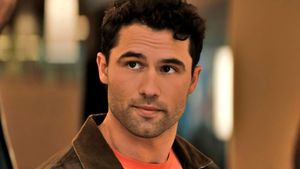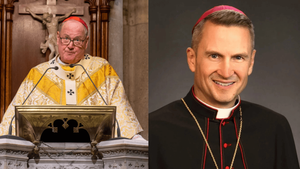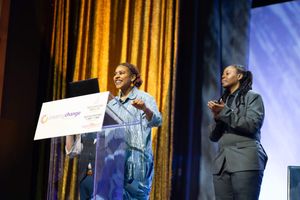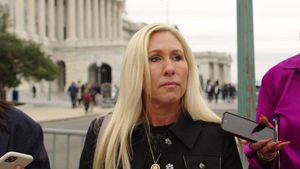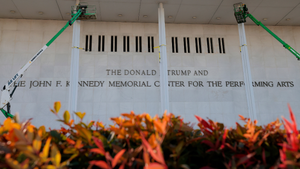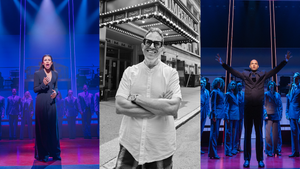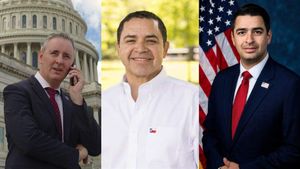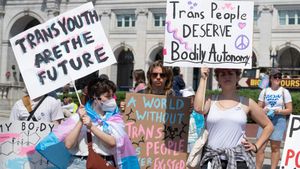Treatment GuideJust DiagnosedSex & DatingAfrican AmericanStigmaAsk the HIV DocPrEP En EspañolNewsVoicesPrint IssueVideoOut 100
CONTACTCAREER OPPORTUNITIESADVERTISE WITH USPRIVACY POLICYPRIVACY PREFERENCESTERMS OF USELEGAL NOTICE
© 2025 Pride Publishing Inc.
All Rights reserved
All Rights reserved
By continuing to use our site, you agree to our Privacy Policy and Terms of Use.
For New York City AIDS activist Victor Mooney, the time-honored children's song 'Row, Row, Row Your Boat' is about to take on a whole new, very serious meaning. It is not a placid stream Mooney will be traveling gently down when he launches a global AIDS awareness event on February 1'it is the entire breadth of the Atlantic Ocean. [Editor's note: As of mid February 2005 the Goree Challenge has been rescheduled to begin in March.] Mooney, a 40-year-old community outreach and public affairs officer at Brooklyn's ASA Institute of Business and Computer Technology, intends to singlehandedly row across the Atlantic'from Gor'e (an island town that is part of the West African country of Senegal) to Bahia, Brazil, and then up through the Caribbean and along the U.S. East Coast to his home in New York. The 8,000-mile Gor'e Challenge'during which Mooney will make short stops to deliver HIV awareness and prevention messages in key nations, particularly in South America and the Caribbean'will take an estimated eight to nine months. 'I strongly believe that HIV is preventable, and that is the message I try to get out whenever I am doing a rowing event,' Mooney explains. 'I believe that by doing this I can help draw attention to the fact that we need to put the fire out on this disease, because it is spiraling again. It is insane. So I am hoping people will see what I am trying to do and that it will get people talking again at the dinner table about HIV and how this disease is preventable.' The Inspiration While rowing and AIDS activism seem unlikely bedfellows, Mooney says he decided to marry the two in May 2000, shortly after New York'based Cardinal John O'Connor died. Mooney, a devout Roman Catholic, says the death of the religious leader, whom he describes as enormously compassionate to AIDS patients, compounded the grief he already felt from the death of his brother Tony to AIDS in 1983 and the diagnosis of another brother as HIV-positive. It also prodded him to search for a way to combine his love of water sports with his burgeoning desire to make a personal contribution to the global AIDS fight. An avid rower since childhood''I grew up on Long Island, so I have always been a water person,' he says'Mooney decided to draw attention to AIDS issues by publicly challenging himself to long-distance rows that would test his endurance. He also hoped his unusual physical feats, like rowing around New York's Long Island and on stationary machines in 48-hour marathon sessions, would draw public and media attention to his AIDS education mission. 'I want people to see me and think, If he can do that, I can certainly walk down the street and get tested [for HIV antibodies],' Mooney explains. In the summer of 2000, Mooney made his first public AIDS awareness row with a 30-mile trip from Manhattan's Queensboro Bridge to the Verrazano-Narrows Bridge, which links Brooklyn to Staten Island. The row became an annual event'Paddle for HIV/AIDS'and its distance has significantly expanded over the years to a 365-mile trip that circumnavigates Long Island and Manhattan. But it was an NYPD Harbor Unit Patrol officer at the conclusion of Mooney's 2004 event who, standing in the shadow of the United Nations building in Manhattan, planted the first seeds for what ultimately became the upcoming transatlantic challenge, according to Mooney. 'He said, 'Victor, if you got a bigger boat, you could probably go faster and farther.' That got me thinking,' Mooney says. 'I went home and started doing research on the Internet on people doing transatlantic rows and saw that other people had done them, particularly the English and the Russians. And I started to think that I could do it too.' Just a few weeks later, after planning with oceanographers and weather experts, studying ocean currents and wind patterns, and completing a U.S. Sailing Safety at Sea Seminar that meets International Sailing Federation requirements, Mooney officially announced in September his upcoming transatlantic crossing. He has also received support from rowing associations, such as England's Woodvale Events, which discounted the price of a suitable ocean boat Mooney purchased for the trip, and the Ocean Rowing Society, which offered to ship the boat from England to New York City at no cost. The trip is set to begin at Gor'e on February 1, the first day of Black History Month. The Preparation Because Mooney will be alone on his voyage'no support vessels will accompany him'his 24-foot 7-inch boat had to be specially equipped to protect him against all sorts of inclement weather, possibly even hurricanes during the summer and fall. It also carries solar panels to generate electricity, provides a small berth for him to sleep, and is equipped with sophisticated communications technology from trip sponsors Globalstar and Contact 3.0 Expedition Software that will enable him to interact live via a satellite Web hookup with classrooms, AIDS service agencies, and media outlets. A system to remove salt from seawater to make it suitable for drinking also will be aboard, as will several weeks' worth of freeze-dried meals and energy bars. Fishing equipment also will be stored on the boat should Mooney grow weary of military-style freeze-dried rations. 'It's definitely not an ordinary rowboat,' Mooney says with a laugh. 'It is specially designed for an ocean crossing'and it is self-righting, so if it capsizes, it will automatically flip back over. If the weather becomes too turbulent, I can actually close myself in a hatch, put a hard hat on, and ride the weather out.' Support staff in New York will use global-positioning-system technology to keep track of Mooney's position and will check in regularly with the rower via his Internet hookup. And Mooney also will have sophisticated satellite telephone equipment handy in case of a serious emergency. But it is not the safety features of the boat or even calculating the amount of supplies he will need that concerns Mooney the most about the trip. It is the isolation he will experience, being thousands of miles from home and alone in the middle of the Atlantic Ocean, particularly during the Africa-to-Brazil crossing, which is expected to take three to four months. Mooney says he is taking a selection of music and recorded books to help him pass the time, but he does anticipate that he will feel very much alone during the voyage. It is in those times of intense isolation when Mooney says he will rely on his deep religious faith to see him through. 'I'll be drawing all my strength from God, because I believe he is carrying me,' he explains. 'I definitely put God first. Without him, I could not do this at all. I must remain focused on keeping him first in my life.' To get in shape for the months-long voyage, Mooney began a rigorous training program in September and works with a professional rowing coach six days a week. Mooney's wife, Su-ping, is also pitching in to help with his physical training. He has also consulted with a dietitian and has added yoga to his workouts: 'It increases my flexibility and also helps my mind to stay focused,' he says. The Actuation The unusual travel route Mooney selected for his transatlantic crossing also will play a role in keeping him focused, he says. Most athletes crossing the ocean by boat choose to leave from the Canary Islands, located off the coast of Morocco in Northern Africa. But Mooney selected Gor'e, about 1,200 miles farther south, because of its historical significance in the African slave trade. 'Gor'e island was one of the many slave-holding sites in West Africa,' he explains. 'Bahia, Brazil [the first stop on the trip], was one of the largest recipients of Africans during the slave trade. Because of my ancestry, I wanted the journey to be symbolic of that slave passage.' The historical route also was chosen'and the departure date set during Black History Month'specifically to appeal to African-Americans and people of African descent in the Caribbean, who are at high risk for HIV infection. According to data released by the Centers for Disease Control and Prevention in December, African-Americans, who make up about 13% of the U.S. population, accounted for 51% of new U.S. HIV diagnoses from 2000 to 2003. The '2004 AIDS Epidemic Update,' released in November by the World Health Organization and the Joint United Nations Programme on HIV/AIDS, shows that the Caribbean has the second-highest HIV prevalence rate in the world, behind only sub-Saharan Africa. About 2.3% of all adults in the region are HIV-positive. Lynn Schulman, a spokeswoman for New York's Gay Men's Health Crisis, the oldest AIDS service organization in the United States, praised Mooney's efforts to reach these at-risk populations. 'Raising awareness about knowing one's HIV status and preventing HIV transmission are always critical but are now especially crucial in communities of color, which have recently experienced the greatest increases in HIV diagnoses, mostly among young people and women' she says. On the second leg of Mooney's trip'from Brazil to New York City'he plans to make stops in Suriname, Venezuela, Guyana, Haiti, the Dominican Republic, and a number of other Caribbean islands to give HIV awareness talks and urge listeners to get tested for HIV. 'I really hope my message resonates with descendants of Africans and with African-Americans,' Mooney says. 'If I can speak directly to them, I will be able to tell them that our ancestors did not have a choice when they were sent to the Americas. But we do when it comes to fighting HIV. Get involved. Get educated. Get tested for HIV. I am looking forward to being able to share that message with my brothers and sisters.'
From our Sponsors
Most Popular
“So much life to live”: Eric Nieves on thriving with HIV
September 03 2025 11:37 AM
The Talk: Beyond the exam room
August 13 2025 3:15 PM
Thanks to U=U, HIV-positive people can live long, happy, healthy lives
July 25 2025 2:37 PM
BREAKING: Supreme Court rules to save free access to preventive care, including PrEP
June 27 2025 10:32 AM
Messenger RNA could be the key to an HIV vaccine — but government cuts pose a threat
August 20 2025 8:02 AM
“I felt like a butterfly”: Niko Flowers on reclaiming life with HIV
July 23 2025 12:22 PM
Dancer. Healer. Survivor. DéShaun Armbrister is all of the above
July 02 2025 8:23 PM
The Talk: Starting the conversation
July 25 2025 4:47 PM
The lab coat just got queer
August 21 2025 10:00 AM
Plus: Featured Video
Latest Stories
HIV-positive men stage 'Kiss-In' protest at U.S.-Mexico border
December 01 2025 12:56 PM
What the AIDS crisis stole from Black gay men
December 01 2025 6:00 AM
Amazing People of 2025: Javier Muñoz
October 17 2025 7:35 PM
It’s National PrEP Day! Learn the latest about HIV prevention
October 10 2025 9:00 AM
“I am the steward of my ship”: John Gibson rewrites his HIV narrative
September 16 2025 2:56 PM
The Talk: Owning your voice
August 25 2025 8:16 PM
The Talk: Navigating your treatment
August 01 2025 6:02 PM
How the Black AIDS Institute continues to fill in the gaps
July 25 2025 1:06 PM
1985: the year the AIDS crisis finally broke through the silence
June 26 2025 11:24 AM
VIDEO: A man living with HIV discusses his journey to fatherhood
June 10 2025 4:58 PM
Trump admin guts $258 million in funding for HIV vaccine research
June 03 2025 3:47 PM
Grindr is reminding us why jockstraps are so sexy and iconic
May 02 2025 5:36 PM
HRC holds 'die-in' to protest Trump health care cuts
April 28 2025 2:11 PM
Two right-wing Supreme Court justices signal they may uphold access to PrEP and more
April 21 2025 4:10 PM
500,000 Children at Risk: PEPFAR Funding Crisis
April 08 2025 3:51 PM
Broadway's best raise over $1 million for LGBTQ+ and HIV causes
April 03 2025 7:15 PM
The Talk Season 5 premieres this spring with HIV guidance for the newly diagnosed
March 26 2025 1:00 PM









































